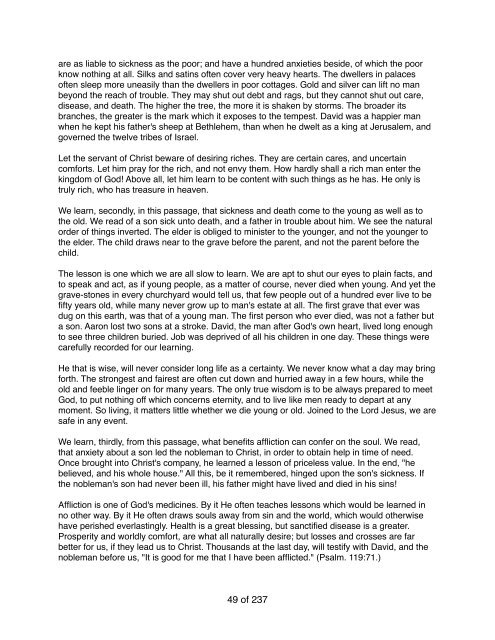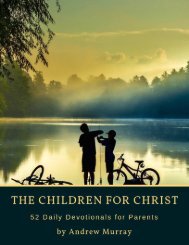J. C. Ryle John
John Charles Ryle (May 10, 1816 - June 10, 1900) was an evangelical Anglican clergyman and first Bishop of Liverpool. He was renowned for his powerful preaching and extensive tracts.
John Charles Ryle (May 10, 1816 - June 10, 1900) was an evangelical Anglican clergyman and first Bishop of Liverpool. He was renowned for his powerful preaching and extensive tracts.
You also want an ePaper? Increase the reach of your titles
YUMPU automatically turns print PDFs into web optimized ePapers that Google loves.
are as liable to sickness as the poor; and have a hundred anxieties beside, of which the poor<br />
know nothing at all. Silks and satins often cover very heavy hearts. The dwellers in palaces<br />
often sleep more uneasily than the dwellers in poor cottages. Gold and silver can lift no man<br />
beyond the reach of trouble. They may shut out debt and rags, but they cannot shut out care,<br />
disease, and death. The higher the tree, the more it is shaken by storms. The broader its<br />
branches, the greater is the mark which it exposes to the tempest. David was a happier man<br />
when he kept his father's sheep at Bethlehem, than when he dwelt as a king at Jerusalem, and<br />
governed the twelve tribes of Israel.<br />
Let the servant of Christ beware of desiring riches. They are certain cares, and uncertain<br />
comforts. Let him pray for the rich, and not envy them. How hardly shall a rich man enter the<br />
kingdom of God! Above all, let him learn to be content with such things as he has. He only is<br />
truly rich, who has treasure in heaven.<br />
We learn, secondly, in this passage, that sickness and death come to the young as well as to<br />
the old. We read of a son sick unto death, and a father in trouble about him. We see the natural<br />
order of things inverted. The elder is obliged to minister to the younger, and not the younger to<br />
the elder. The child draws near to the grave before the parent, and not the parent before the<br />
child.<br />
The lesson is one which we are all slow to learn. We are apt to shut our eyes to plain facts, and<br />
to speak and act, as if young people, as a matter of course, never died when young. And yet the<br />
grave-stones in every churchyard would tell us, that few people out of a hundred ever live to be<br />
fifty years old, while many never grow up to man's estate at all. The first grave that ever was<br />
dug on this earth, was that of a young man. The first person who ever died, was not a father but<br />
a son. Aaron lost two sons at a stroke. David, the man after God's own heart, lived long enough<br />
to see three children buried. Job was deprived of all his children in one day. These things were<br />
carefully recorded for our learning.<br />
He that is wise, will never consider long life as a certainty. We never know what a day may bring<br />
forth. The strongest and fairest are often cut down and hurried away in a few hours, while the<br />
old and feeble linger on for many years. The only true wisdom is to be always prepared to meet<br />
God, to put nothing off which concerns eternity, and to live like men ready to depart at any<br />
moment. So living, it matters little whether we die young or old. Joined to the Lord Jesus, we are<br />
safe in any event.<br />
We learn, thirdly, from this passage, what benefits affliction can confer on the soul. We read,<br />
that anxiety about a son led the nobleman to Christ, in order to obtain help in time of need.<br />
Once brought into Christ's company, he learned a lesson of priceless value. In the end, "he<br />
believed, and his whole house." All this, be it remembered, hinged upon the son's sickness. If<br />
the nobleman's son had never been ill, his father might have lived and died in his sins!<br />
Affliction is one of God's medicines. By it He often teaches lessons which would be learned in<br />
no other way. By it He often draws souls away from sin and the world, which would otherwise<br />
have perished everlastingly. Health is a great blessing, but sanctified disease is a greater.<br />
Prosperity and worldly comfort, are what all naturally desire; but losses and crosses are far<br />
better for us, if they lead us to Christ. Thousands at the last day, will testify with David, and the<br />
nobleman before us, "It is good for me that I have been afflicted." (Psalm. 119:71.)<br />
49 of 237




